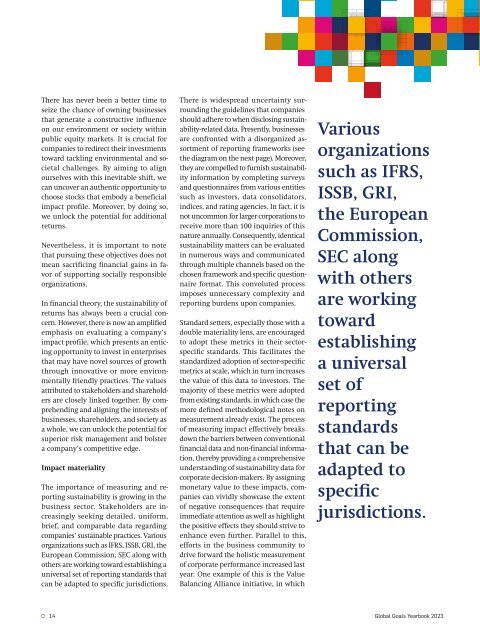Global Goals Yearbook 2023 makes SDG impact measurable
No poverty, no hunger, peace: In 2015, the United Nations adopted the 17 Sustainable Development Goals, which were supposed to make the world a better place by 2030. Now it is half-time. The results are sobering. In the remaining time, measures must be more targeted and more effective. On the occasion of COP28 in Dubai, the Global Goals Yearbook is focusing on the aspect of impact.
No poverty, no hunger, peace: In 2015, the United Nations adopted the 17 Sustainable Development Goals, which were supposed to make the world a better place by 2030. Now it is half-time. The results are sobering. In the remaining time, measures must be more targeted and more effective. On the occasion of COP28 in Dubai, the Global Goals Yearbook is focusing on the aspect of impact.
Create successful ePaper yourself
Turn your PDF publications into a flip-book with our unique Google optimized e-Paper software.
There has never been a better time to<br />
seize the chance of owning businesses<br />
that generate a constructive influence<br />
on our environment or society within<br />
public equity markets. It is crucial for<br />
companies to redirect their investments<br />
toward tackling environmental and societal<br />
challenges. By aiming to align<br />
ourselves with this inevitable shift, we<br />
can uncover an authentic opportunity to<br />
choose stocks that embody a beneficial<br />
<strong>impact</strong> profile. Moreover, by doing so,<br />
we unlock the potential for additional<br />
returns.<br />
Nevertheless, it is important to note<br />
that pursuing these objectives does not<br />
mean sacrificing financial gains in favor<br />
of supporting socially responsible<br />
organizations.<br />
In financial theory, the sustainability of<br />
returns has always been a crucial concern.<br />
However, there is now an amplified<br />
emphasis on evaluating a company’s<br />
<strong>impact</strong> profile, which presents an enticing<br />
opportunity to invest in enterprises<br />
that may have novel sources of growth<br />
through innovative or more environmentally<br />
friendly practices. The values<br />
attributed to stakeholders and shareholders<br />
are closely linked together. By comprehending<br />
and aligning the interests of<br />
businesses, shareholders, and society as<br />
a whole, we can unlock the potential for<br />
superior risk management and bolster<br />
a company’s competitive edge.<br />
Impact materiality<br />
The importance of measuring and reporting<br />
sustainability is growing in the<br />
business sector. Stakeholders are increasingly<br />
seeking detailed, uniform,<br />
brief, and comparable data regarding<br />
companies’ sustainable practices. Various<br />
organizations such as IFRS, ISSB, GRI, the<br />
European Commission, SEC along with<br />
others are working toward establishing a<br />
universal set of reporting standards that<br />
can be adapted to specific jurisdictions.<br />
There is widespread uncertainty surrounding<br />
the guidelines that companies<br />
should adhere to when disclosing sustainability-related<br />
data. Presently, businesses<br />
are confronted with a disorganized assortment<br />
of reporting frameworks (see<br />
the diagram on the next page). Moreover,<br />
they are compelled to furnish sustainability<br />
information by completing surveys<br />
and questionnaires from various entities<br />
such as investors, data consolidators,<br />
indices, and rating agencies. In fact, it is<br />
not uncommon for larger corporations to<br />
receive more than 100 inquiries of this<br />
nature annually. Consequently, identical<br />
sustainability matters can be evaluated<br />
in numerous ways and communicated<br />
through multiple channels based on the<br />
chosen framework and specific questionnaire<br />
format. This convoluted process<br />
imposes unnecessary complexity and<br />
reporting burdens upon companies.<br />
Standard setters, especially those with a<br />
double materiality lens, are encouraged<br />
to adopt these metrics in their sectorspecific<br />
standards. This facilitates the<br />
standardized adoption of sector-specific<br />
metrics at scale, which in turn increases<br />
the value of this data to investors. The<br />
majority of these metrics were adopted<br />
from existing standards, in which case the<br />
more defined methodological notes on<br />
measurement already exist. The process<br />
of measuring <strong>impact</strong> effectively breaks<br />
down the barriers between conventional<br />
financial data and non-financial information,<br />
thereby providing a comprehensive<br />
understanding of sustainability data for<br />
corporate decision-makers. By assigning<br />
monetary value to these <strong>impact</strong>s, companies<br />
can vividly showcase the extent<br />
of negative consequences that require<br />
immediate attention as well as highlight<br />
the positive effects they should strive to<br />
enhance even further. Parallel to this,<br />
efforts in the business community to<br />
drive forward the holistic measurement<br />
of corporate performance increased last<br />
year. One example of this is the Value<br />
Balancing Alliance initiative, in which<br />
Various<br />
organizations<br />
such as IFRS,<br />
ISSB, GRI,<br />
the European<br />
Commission,<br />
SEC along<br />
with others<br />
are working<br />
toward<br />
establishing<br />
a universal<br />
set of<br />
reporting<br />
standards<br />
that can be<br />
adapted to<br />
specific<br />
jurisdictions.<br />
14 <strong>Global</strong> <strong>Goals</strong> <strong>Yearbook</strong> <strong>2023</strong>
















